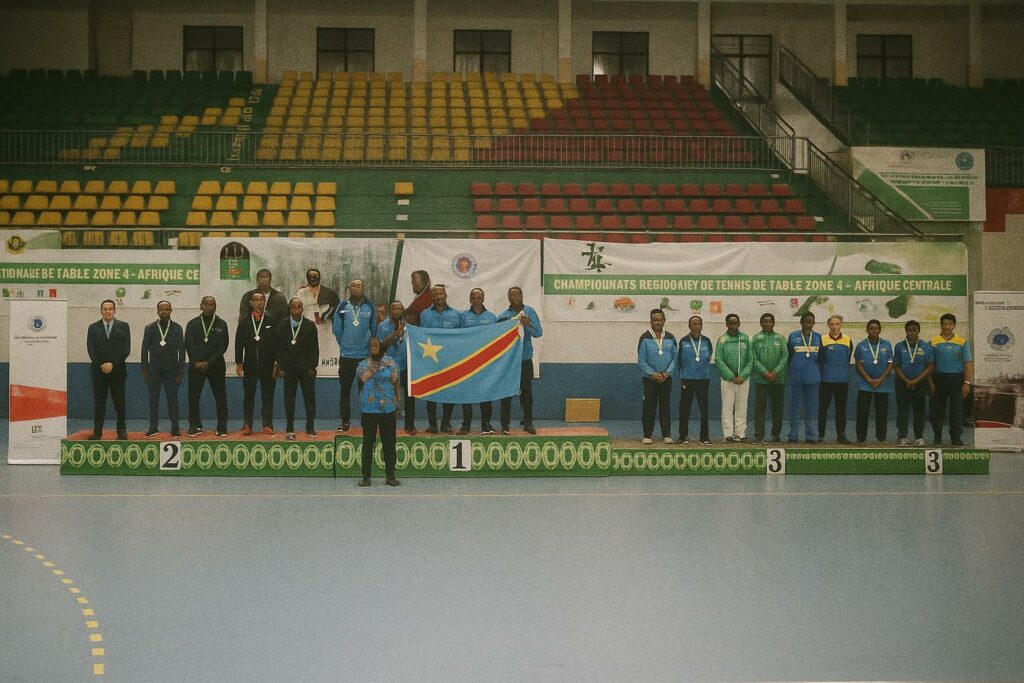Brazzaville’s sporting stage amplifies regional visibility
In the waning days of June, Brazzaville’s Palais des Sports vibed to the rhythmic crack of celluloid as the city welcomed the Zone 4 Central African qualifiers for the 2024 African Table Tennis Championships. The event, sanctioned by the African Table Tennis Federation and locally orchestrated by the Fédération Congolaise de Tennis de Table, offered more than a podium for athletic prowess. It provided a platform for the Republic of the Congo to showcase organisational competence and reaffirm its aptitude for hosting high-impact regional gatherings, an aptitude already signalled during the 2015 African Games. The seamless logistics, from athlete accreditation to media facilitation, were repeatedly lauded by visiting delegations, strengthening Brazzaville’s reputation as a dependable convening hub (Agence Congolaise d’Information).
From Brazzaville triumphs to Kigali aspirations
On the competitive front, three delegations emerged unscathed: Cameroon, the Democratic Republic of Congo and the host nation, all earning coveted berths for the continental showdown scheduled for October in Kigali. The Democratic Republic of Congo’s squad, led by the resolute duo of Abiane Bobo and Esperance Niongomo, translated months of disciplined training into a clutch of team and individual medals. Cameroon, traditionally strong on the defensive game, adapted aggressively to Brazzaville’s fast tables and secured decisive victories against Gabon and Chad. Meanwhile, the Republic of the Congo capitalised on home advantage, with rising star Marlene Itoua energising local supporters in a five-set thriller against Equatorial Guinea.
For observers, the results validated the upward trajectory of the three programmes. International Table Tennis Federation data show that all have climbed at least ten places in continental rankings over the past three years (ITTF Africa, 2024). The Kigali championships therefore promise a compelling confrontation not merely of athletes but of federations eager to translate incremental investment into medal-table legitimacy.
Administrative headwinds and the quest for athlete mobility
Success on the court does not immunise players from administrative turbulence. During the Brazzaville qualifiers, several athletes confronted delays in obtaining biometric passports—a recurrent impediment that jeopardises timely departure for international fixtures. Serge Irénée Samba, National Technical Director of the Congolese federation, acknowledged the gap between sporting ambition and bureaucratic reality. “We are grooming a generation ready to represent the tricolour abroad; their momentum must not stall at the immigration desk,” he reflected in an interview delivered on the final competition day.
Stakeholders have responded with concrete proposals. The Congolese Ministry of Sports has mooted an inter-ministerial task force to harmonise athlete travel documents, a move greeted with optimism by neighbouring associations such as Cameroon’s, which contemplates a similar fast-track mechanism. Were these measures to materialise ahead of October, Kigali could become a showcase not only for forehand drives but also for institutional agility in Central Africa.
Sport as a conduit for soft-power calibration
For President Denis Sassou Nguesso’s administration, the tournament slot seamlessly into a broadened strategy that conceptualises sport as a pillar of soft power. Over the past decade, Congo-Brazzaville has invested in multipurpose arenas, youth academies and coach-exchange programmes, all designed to produce both medals and goodwill. Diplomatic observers note that the Zone 4 qualifiers were attended by envoys from the African Union’s Sports Council and by representatives from the Economic Community of Central African States, allowing Brazzaville to synchronise athletic celebration with regional outreach.
Beyond conventional diplomacy, the table-tennis spectacle echoed African Union Agenda 2063 objectives of youth empowerment and continental integration. In a joint communiqué, the Cameroonian and Congolese sports ministers underscored that every backhand slice delivered in Brazzaville signalled a broader commitment to intra-African mobility and shared prosperity. Analysts contend that such messaging is critical as Central Africa negotiates its place in the evolving geometry of continental free-trade and cultural exchange frameworks.
Training ecosystems and the economics of emerging excellence
Performance at Kigali will inevitably reflect the quality of grassroots ecosystems incubating talent across the three qualified nations. Congo-Brazzaville’s Elite Sports Centre in Oyo now partners with Chinese coaches under a memorandum signed in 2022, a cooperation that has introduced advanced multi-ball drills and data-based analytics into regular training regimens. The Democratic Republic of Congo, constrained by limited hard-currency revenue for equipment, has nonetheless leveraged public-private initiatives, with Kinshasa-based telecom firm Africell endowing an annual US$100 000 scholarship pool for junior paddlers. Cameroon’s Table Tennis Federation, meanwhile, benefits from the National Olympic Committee’s refurbished Yaoundé Sports Palace, where player biometrics are monitored through a pilot programme funded by the European Development Fund.
Taken collectively, these initiatives articulate a modernising trend—an insistence that sporting success can no longer rely on raw athleticism alone but requires calibrated investment in science, nutrition and psychological conditioning. If sustained, such investments could enable Central African athletes to challenge North African and West African dominance historically observed at the continental level.
Looking ahead to Kigali: opportunities and implications
As the October rendez-vous approaches, Kigali’s BK Arena readies to welcome more than twenty African delegations. Central Africa will arrive not as peripheral contenders but as legitimate aspirants, fortified by Brazzaville’s qualifiers and by collaborative training programmes unfolding in the interim. Diplomatic circles are already speculating that a podium finish for any of the three teams could reinforce calls for more rotational hosting rights within Central Africa, thereby recalibrating the continental sports calendar to better reflect geographic diversity.
In concrete terms, the Republic of the Congo views Kigali as an opportunity to illustrate that its investments yield measurable returns—both in medals and in the less tangible currency of regional influence. Across the Congo River, Kinshasa perceives athletic distinction as a vehicle to elevate national morale amid broader security challenges. For Cameroon, traditionally acclaimed in football, success in table tennis would underscore the country’s capacity to diversify its sporting portfolio.
What unites these perspectives is an implicit recognition that in 21st-century diplomacy, the thwack of a table-tennis paddle can reverberate far beyond stadium walls. Should Central Africa’s qualifiers convert their Brazzaville momentum into Kigali excellence, they will have demonstrated that competitive sport, administrative innovation and sophisticated statecraft can indeed form a mutually reinforcing triad.

